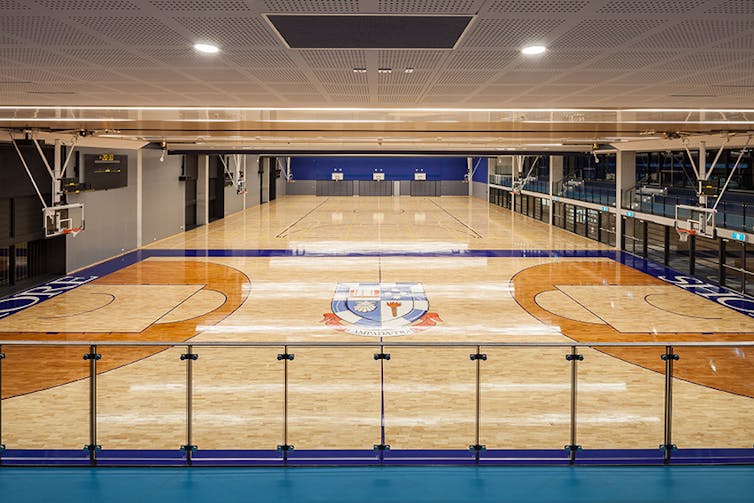The Productivity Commission wants to axe a key tax break for private school donations – but the government is determined to keep it
- Written by Matthew Wade, Lecturer in Social Inquiry, La Trobe University

Giving is in a tough spot in Australia. A declining proportion of us donate to charities, and fewer of us are registering as formal volunteers than in 2018.
However, demand for the work of charities is higher than ever.
Charities Minister Andrew Leigh has deemed this a civic crisis and set a target of doubling philanthropic giving by 2030.
To achieve this, Leigh and Treasurer Jim Chalmers asked the Productivity Commission to conduct a once-in-a-generation 15-month review of philanthropy, which was published last Thursday.
Leigh said he would consider all of the recommendations but one – that donations to school building funds no longer be tax deductible.
Why allow tax deductions for school building donations?
The Productivity Commission is a big supporter of tax deductions as a means of encouraging giving, and recommended changes that would make more charities eligible for tax-deductible gift recipient status.
But it said there was currently “no coherent policy rationale” for why some charities got deductible gift recipient status and others missed out.
A rationale was needed because tax-deductible status effectively renders taxpayers co-investors with donors in the entities given such status.
The Commission wanted decisions about which activities were eligible to be guided by three principles:
Will the activity generate community-wide benefits and otherwise be undersupplied?
Is subsidising donations the best way to support this activity?
Could donations be unjustly converted into private benefits for donors?
Using these principles, the Commission recommended that while many more charities should receive access to deductible gift recipient status, some should have their status withdrawn, among them school building funds.
School buildings arguably met the first of the Commission’s tests. They might be said to generate community benefits that could otherwise be undersupplied.
But the Commission found they did not meet its second and third tests.
There were better ways to support them with government funding, and there was a “material risk” that donors could convert tax‑deductible donations into private benefits, as donations may “substitute for fees”.
Backlash swift and fierce
When the Commission suggested this in its draft report, released in November, the backlash was swift and fierce.
The National Catholic Education Commission called it a “direct attack” on faith communities. Others said it would erode “Judeo-Christian values”.
Although overblown, such reactions proved effective in threatening to drag a sober reform into a tiresome “culture war”.
Deductible contributions to school building funds were introduced in 1954 as a pragmatic response to rapid growth in enrolments.
A more regressive system ‘hard to imagine’
Leading tax scholar Professor Ann O’Connell says tax deductions for building contributions enabled governments to indirectly support private schools without being seen to prop them up at the expense of public schools.
This was pragmatic and sensible at the time. But 70 years later, Australia’s 3,500 private school building funds have become a key driver of shameful disparities in educational facilities.
The reasons are obvious enough. The typical donors are parents and alumni, and the wealthiest among them are the best-equipped to exploit the concession. This directs the biggest benefits to the highest-fee (usually most “elite”) schools.
The Commission finds the richest 1% of school building funds get 36% of total donations. The top 10% get 83%.
A more regressive mechanism is hard to imagine. Taxpayer subsidies for private school buildings now approach A$100 million per year.
Tax concessions reflect what we value
In rejecting the Commission’s recommendation as soon as he released its report, Leigh said a “world-class education system is essential to tackling inequality”.
It’s a pity he didn’t decide to use the “once in a generation” opportunity to tackle inequality within education aided by distorted giving incentives.
For what it’s worth, Leigh is an excellent charities minister, genuinely committed to his portfolio. I also suspect he knows the status quo is both ethically and fiscally indefensible.
But that’s precisely what makes the response so disheartening.
It’s not simply about the waste inherent in directing public funds to places that don’t much need them. It’s also about the moral injury of witnessing something manifestly unfair.
Such injustices undermine the social solidarity Leigh says he wants to rebuild .
An opportunity squandered
If even such modest reforms are electorally “too hard”, what hope is there for more meaningful reforms?
Even ones as modest as taking away the tax exemptions granted to the Australian Football League and National Rugby League.
One of Leigh’s pet projects, the Australian Centre for Evaluation, is intended to
put evaluation evidence at the heart of policy design and decision-making, so the Australian government can have confidence its programs and policies are delivering better outcomes for Australians and achieving value for money.
It sounds great, but what’s the point if you disregard advice from an already-established body set up to evaluate evidence?
Leigh and colleagues have squandered an opportunity to fix a festering issue that will only worsen over time.
Authors: Matthew Wade, Lecturer in Social Inquiry, La Trobe University



















